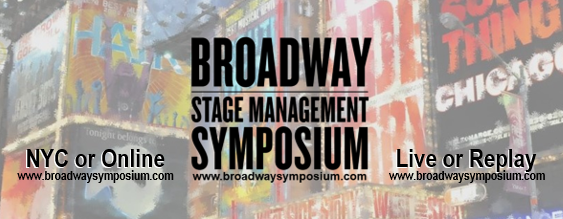
When there isn’t a show to stage manage, what is a stage manager to do? It’s a great time for professional development. A time to reflect, review, and renew. As I’m sitting in my apartment in New York, I’ve been thinking about this and put together a list of my top 5 books for stage managers that focus on the leadership attributes so important to our profession.
They are all great reads and can be found online while sheltering in place, social distancing, self-quarantine, or whatever you want to call it. Even though you can’t be actively practicing your craft, you can still be growing as a stage manager, as a leader, and as a person throughout this challenging time. Once this is over and we get back to making theatre, we are going to need to be at our very best.
This classic best seller, written by the great Stephen Covey back in 1989, shares eye opening principles to achieve any goal. His approach is based on concepts of character, values, and human dignity that feel like they are eternal, even if you’ve never thought of them before. The seven habits guide you through gaining true independence, to the interdependence necessary for teamwork, and achievement of any goal, in “business” or show biz.
There have been numerous editions published, including some for kids and teens. The concepts are truly universal and have literally benefited millions of readers of all ages. These seven simple principles include revelations such as: response-ability, the important-urgent matrix, and various ways to “sharpen your saw.” The habits Covey describes are simple and elegant, a concrete approach to your own skill set and how to lead a group.
Steve Farber’s parable takes us on an adventure to discover the meaning of extreme leadership. A top motivational leadership speaker and consultant, Farber encapsulates his approach with the acronym: L.E.A.P. It’s a simple, yet powerful way to become what he calls an “extreme leader.” Farber breaks down each category of L.E.A.P. (Love, Energy, Audacity, & Proof) with great examples that are woven into a story that demonstrates the power of this philosophy.
In essence, by loving what you do, you create the energy to reach for audacious goals, and prove you are willing to do the work to get there. Farber says the most audacious goal is to change the world, which really resonates today. In our business we can change our small “w” world in a variety of positive ways, and those all lead to making changes in the big “W” World.
In his book, Adam Grant reveals what he learned through years of research into people and organizations. He presents a new perspective that examines our personal habits as givers, takers, or matchers and how these personality types interact and function in business. Give and Take was named one of the best books of 2013 by Amazon, Apple, as well as the Wall Street Journal, and Oprah is a fan too!
Through illuminating stories and hard evidence, he shows how ourselves and our organizations can function better by understanding the power and results of giving, taking, and matching. He highlights tools for effective collaboration, networking, negotiation and leadership. Understanding the three personality traits, the effectiveness of the different approaches, and how they intersect and interact is revelatory and insightful. As a stage manager, who gives so much for others, his conclusions are very powerful.
Shawn Achor co-designed the Happiness course at Harvard. Like Adam Grant, his book is the result of years of research. What Achor’s research shows are core principles of positive psychology that can enrich our lives, improve our performance, benefit our careers, and achieve success. The big take away from The Happiness Advantage is how mindset (aka happiness) does more to influence and drive actual success than actual success results in changes in your state of mind (or happiness). So, if you want to do better, you have to feel better first!
In anecdotes and research, Achor demonstrates the power of mindset in individuals and groups. He discusses various positivity techniques and gratitude practices to reframe your state of mind and how performance and achievement grow as a result. These insights can do wonders in our lives and work as stage managers. Happiness does not have to be elusive and something we are always chasing. The power of mindset can create happiness and, therefore, a skill very worth cultivating. You can bring positive energy wherever you go. Or if you can’t go anywhere (like now), you can find the way to be happy right where you are.
The last book on this list is not one that falls in to psychology or “self-help” categories. It’s historical. Forged In Crisis by Nancy Koehn tells five inspiring stories of leaders dealing with a critical situation: Abraham Lincoln, the explorer Ernest Shackleton, abolitionist Frederick Douglas, environmentalist Rachel Carson, and clergyman Dietrich Bonhoeffer. They all faced crises that required leadership to survive. Koehn shares their stories and shows how each person overcame their unique and massive challenges. The book also probes into the history and development of each person, revealing the process of how they grew to be a great leader: courageous, powerful, and capable.
Through these specific and well researched case studies, Koehn shows us universal truths in leadership. As valuable as mindset, philosophy, and approach are, this historical look gives us context and perspective on the art of leadership. We stage managers are rarely in life and death circumstances, but the development of these leaders and the solutions they forged, are lessons that resonate. These lessons reveal connections in decision making, process, and communication that help us be the best we can, no matter what the circumstance.
Happy reading! Stay home, stay safe, stay healthy and wash your hands.
Super Bowl Sunday: How Theatre and Football are Alike
Advice for Stage Managers from Dr. Seuss



The mission of the Broadway Stage Management Symposium is to create a safe and welcome place for stage managers to connect, share, learn and inspire. Each year, our annual event brings together the most experienced and highly-regarded Stage Management professionals on Broadway for a two-day program that offers practical insights, instruction, and inspiration for anyone interested in stage management. Through a variety of panels, Broadway’s stage managers share their experience, techniques, offer practical career advice, and answer questions. These sessions dive deep into important issues for stage managers of all levels, revealing insights into the why’s and how’s of stage management, that only come with the benefits of decades on Broadway. This unique forum presents opportunities to engage with top professionals as well as network with fellow attendees, exponentially growing professional relationships and opportunities. Past attendees have come from all over the U.S., as well as Argentina, Bolivia, Canada, Mexico, and Australia and some alumni have gone on to work on Broadway shows. By sharing their knowledge, Broadway stage managers give a hand up to the next generation, illuminate proven strategies for success, and advance the profession. As the leaders of a company, stage managers’ actions have a significant impact on a show and its participants. The Symposium helps stage managers develop the tools for successful leadership and stewardship. In this way, the Symposium can have a positive impact not only on stage managers’ career, but the industry at large. Please join us for our annual event and the ongoing conversation all year long over our social media platforms (twitter, Instagram, facebook & tumblr) as well as the Symposium blog.
Read Full Profile© 2021 TheatreArtLife. All rights reserved.

Thank you so much for reading, but you have now reached your free article limit for this month.
Our contributors are currently writing more articles for you to enjoy.
To keep reading, all you have to do is become a subscriber and then you can read unlimited articles anytime.
Your investment will help us continue to ignite connections across the globe in live entertainment and build this community for industry professionals.